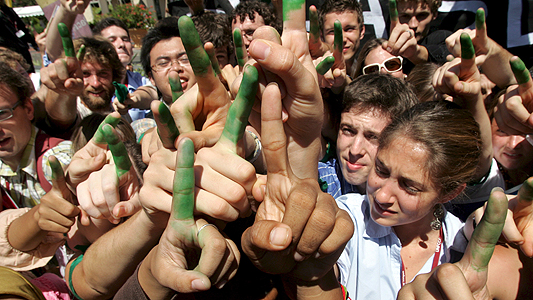World reacts to Bali deal
A selection of comments following the United Nations Bali deal on climate change.

 |
| Activists in Bali show off their green fingers outside UN climate change conference [EPA] |
A last-minute compromise deal to combat climate change at United Nations talks in Bali prompted these reactions.
Ban Ki-moon, United Nations secretary-general
Keep reading
list of 4 itemsThousands evacuate as wildfire grows ‘dramatically’ in western Canada
Guardians of the glaciers – life alongside Pakistan’s vanishing ice
Photos: Kenya sanctuaries toil to save birds of prey from extinction
“I am deeply grateful to many member states for their spirit of flexibility and compromise.”
Paula Dobriansky, US undersecretary of state for democracy and global affairs
“We have our work cut out. Work remains… We joined the consensus … after hearing the comments [from South Africa, Brazil and others] we were assured by their commitment to act.”
Yvo de Boer, executive secretary of United Nations Framework Convention on Climate Change (UNFCCC)
|
was quite close to being acceptable for the US -ultimately they showed very positive flexibility and joined the consensus |
“There was really such a huge momentum to get something agreed there, with countries applauding each other when they made their statements.
“I think it was quite close to being acceptable for the US. Ultimately they showed very positive flexibility and they joined the consensus.
“The text at the beginning does refer to ranges that the inter-governmental panel on climate change has come up with, that indicate what industrialised countries need to do.
It does talk about level of ambition, it does talk about industrialised countries needing to take the lead. I think that provides us with enough of a sense of direction.”
Humberto Rosa, EU chief negotiator
“It was exactly what we wanted, we are indeed very pleased.
“We will have now two tremendously demanding years, starting right in January.”
Hassan Wirajuda, Indonesian foreign minister
“Here in Bali we reached a consensus, [a] global consensus for all countries.
“No single country was excluded, in a very inclusive process … we hope it will provide not only a good basis, but also the momentum in the coming years.”
James Connaughton, chairman of the White House council on environmental quality
“There is no question that we have opened a new page and are moving forward together. It is a strong commitment jointly reached by all countries to advance negotiations.
“This is not a step taken alone by America, this is a step taken by all the countries that the time had come to open a new chapter.”
“We now have one of the broadest negotiating agendas ever on climate change… The large emerging economies, which also produce large amounts of greenhouse gases, also have to be part of the solution.”
Kapil Sibal, Indian science and technology minister
“We wanted to make sure the two-track process was maintained that there was no dilution of the Kyoto protocol.
“The developed world has appreciated that they had commitments and the developing world has appreciated that it has responsibilities.
“If we understand what the roadmap will be, there will be no complications.
“The world community realises that unless the US comes on board we cannot achieve our goal.”
Hilary Benn, UK environmental secretary
“This is a stark breakthrough, it’s been a rollercoaster.”
Jacqueline Cramer, Dutch environment minister
“It was a delicate balance and we were able to really build consensus in this room and indeed the United States was willing to give in.
“The G7 was willing to give in, everybody was willing to give in. We could not leave here without a Bali road map.”
Joyashree Roy, expert on economic of climate change at Jadhavpur university, Kolkata, India
|
This is very positive news -unless the leader is taking the lead then the followers will not follow |
“This is very positive news. Unless the leader is taking the lead, then the followers will not follow.
“But this should not just be a gesture, it must involve commitments, if the United States accepts targets then it will force others to do so.”
“India should make preparations to come up with timelines by when it can make some sort of a commitment – it may be a commitment for emissions cuts or for mitigation efforts.
Everton Vargas, head of Brazil’s delegation
“We are very happy, we think it’s a great success.”
Ned Helme, president of Washington DC-based Centre for Clean Air policy
“It’s great, it’s a real breakthrough.
“It’s the first time that developing countries really took the lead, showed their strength and talked about what kind of programmes they are doing on their own.”